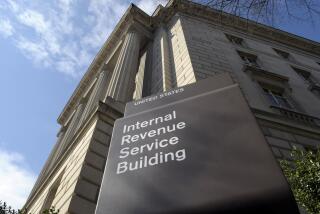Tax Help for Those Serving in Military
- Share via
Members of Congress may not have been able to agree on much last year, but there was no bickering when it came to giving tax breaks to members of the military.
“When there’s a war going on, everybody wants to stand up and show that they’re patriotic,” said Mark Luscombe, principal tax analyst with CCH Inc., a Riverwoods, Ill.-based publisher of tax information. “That helps the military. Giving them tax breaks is one area where legislators could find plenty of common ground.”
Indeed, the Military Family Tax Relief Act of 2003 piled new tax breaks onto existing tax preferences for those in military service, particularly for those in combat, vastly increasing the chances that members of the armed services and their families will receive refunds this year.
Here’s a look at some of the most significant breaks for service members:
* Pay for service in a combat zone is tax-free up to the highest rate of enlisted pay, which was $5,882.70 a month in 2003, Luscombe said. In addition, pay for being in an area of imminent danger is also tax-free.
Officers, who may earn more, will have to pay tax on a portion of their income, said Richard Bayne, a tax professional based in Merced, Calif. The taxable portion of a service member’s pay will be listed on the individual’s W-2 statement.
* All income -- that’s both wages and investment returns -- earned by a member of the armed forces who dies in combat is tax-free for the entire year that the death took place.
This tax exemption applies retroactively to the first year of service in a combat zone, so that family members of those who served all or part of 2002 in combat and died in 2003 would be able to file a refund claim for 2002 taxes paid as well, experts said.
* Military death benefits -- a modest $12,000 stipend to the families of those who die during military service -- became tax-free in 2003. In the past, a glitch in the law caused half of this payment to be taxable even though it was similar to a tax-free life insurance death benefit.
* Child and dependent care provided by the military also was designated a tax-free benefit to service members last year. In the past, the market value of this benefit was supposed to be included when computing eligibility for some tax breaks.
* Housing assistance payments, aimed at allowing military members to recover a loss on the sale of their home when a base closes or reduces operations, also became tax-free in 2003.
* Because much of the pay of those in combat is tax-free -- and pay for housing and dependent care assistance also is exempt from tax -- those with children and working spouses are likely to qualify for the earned income tax credit, a lucrative break generally reserved for the working poor. This break can provide a refund check, even to those who paid no income tax.
* Home sale rules were altered to accommodate military members.
Homeowners can exclude up to $250,000 in profit per person, or $500,000 per couple, in gains on the sale of a personal residence from tax. However, most homeowners must meet a residency test to claim the exclusion. This residency test requires that they live in the home for at least two of the five years before the sale.
Members of the military who are called to “qualified extended duty” -- that’s duty more than 50 miles from home -- won an exception to this residency rule because Congress recognized that military service sometimes demands a nomadic lifestyle.
This rule allows military members to suspend time while in qualified active service.
For example, say that an enlisted man in the Air Force bought a house in 1994 and lived there for three years before being sent on active duty overseas for six years.
If he sold his house in 2003, he normally wouldn’t meet the residency test. However, because he was engaged in “qualified extended duty” he can elect to simply not count the six years he was away, which qualifies him for the exclusion. Up to $250,000 of his home sale profit is tax-free if he’s single. Up to $500,000 is tax-free if he’s married.
This exception was written into the law in 2003, but it applies retroactively to all home sales by military men and women dating to 1997. Those who paid tax on home sale profits during that time have until November 2004 to file a claim for a refund.
* Those serving in a combat zone, deployed in a “contingency operation” or hospitalized outside the United States because of an injury received while serving get additional time to file. The due date for these returns is extended to 180 days after the completion of combat service or discharge from the hospital. No interest or penalties will be assessed for this delay. (When filing these returns, the taxpayer should write “Combat Zone” in red across the top, to flag the fact that there should be no penalties assessed for late filing.)
* Active duty personnel who are outside the United States but not in a combat zone also have more time to file. Instead of April 15, their returns are due June 15. However, as with other taxpayers, a filing extension is not an extension of time to pay, the IRS cautions. Service members who owe but take extra time to pay will be on the hook for interest on any unpaid tax owed. The current interest rate is 4%.
* Members of the National Guard and reserves can now take a deduction for the cost of service-related travel more than 100 miles from home. The deduction is limited to the federal per diem rate, which varies by location. It is, however, available regardless of whether the service member itemizes deductions.
More details on the Military Family Tax Relief Act and other tax laws that affect members of the armed forces can be found in Publication 3, which can be downloaded at www.irs.gov.
More to Read
Inside the business of entertainment
The Wide Shot brings you news, analysis and insights on everything from streaming wars to production — and what it all means for the future.
You may occasionally receive promotional content from the Los Angeles Times.










